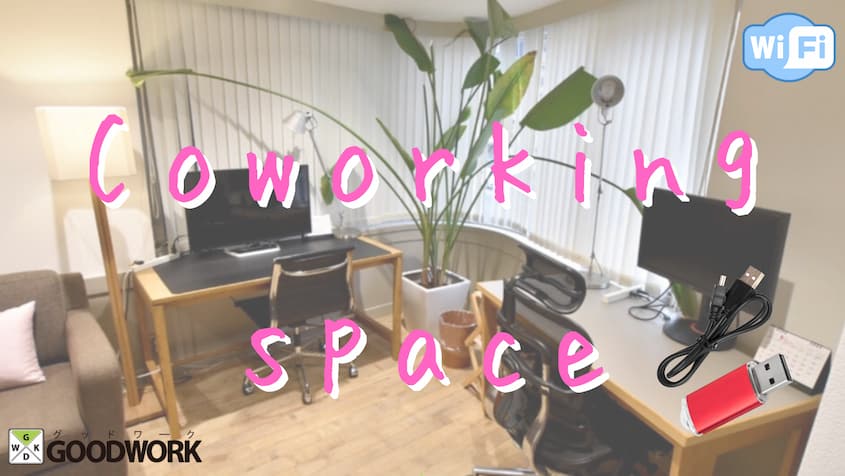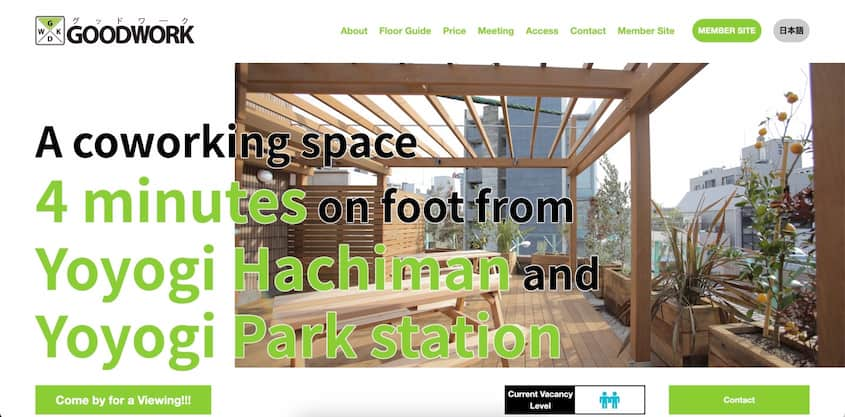

Column


In Japan, the spread of the “new coronavirus infection” pandemic that began in 2020 has led to the rapid spread of remote work and the accompanying increase in awareness of “nomad workers”.
In particular, the spread of nomad workers has been further fueled by the increasing number of places (environments) where it is easy to work, such as “coworking spaces” and “cafes (family restaurants)” that offer free use of Wi-Fi and recharging.
Here, we will provide a detailed explanation of the trending phenomenon of “nomad work” and discuss the working style of nomad workers.

Nomad work is a “new way of working” where individuals carry the necessary devices (laptops, smartphones) with them and work at their preferred locations and times.
The term “nomad work” originates from “nomad,” which refers to wandering or moving, and “work,” indicating the act of working. It represents a style of work that is not tied to any specific company or location.

A nomad worker is someone who practices nomad work (a free way of working without belonging to a company) and is not restricted by location, such as home, coworking spaces, cafes, or hotels.
Nomad workers are often confused with freelancers or remote workers, but each has distinct characteristics.
For instance, freelancers are individuals who enter into “contractual agreements” with companies (clients) to undertake work and receive compensation as independent contractors.
They are considered self-employed individuals, and freelancing is one form of employment.
In the case of freelancers, they may be required to work on-site or adhere to specific working hours set by the client company, which may limit their ability to work as nomad workers.
Remote work refers to individuals who work away from their primary office location, adhering to company rules (such as working hours and location) within certain constraints.
It offers a level of freedom in work, but compared to nomad workers, it typically has lower flexibility.

So far, we have provided a clear explanation of the increasingly recognized concepts of “nomad work” and “nomad workers.”
From here, we will introduce in detail “the recommended places” you might want to know when engaging in nomad work.

The term “Coworking Space” is derived from the combination of the words “Co,” meaning “together or jointly,” “working,” and “space.”
In Japanese, it translates to “a space where people work together.”
Coworking Spaces are primarily frequented by “nomad workers”, “freelancers”, and “remote workers”, making them popular among individuals who prefer a flexible work environment.
At Coworking Spaces, individuals from various industries and professions work together in the same space, sharing resources such as desks, chairs, and networking facilities.
For instance, at「GOODWORK」 in Shibuya, they offer free bread made by a local bakery in the Yoyogi-Uehara area every Wednesday for coworking space users, and on rainy days, they distribute sweets like candy and chocolate.
At first glance, people who work flexibly may seem less stressed, but they need to be able to manage themselves (self-management) and can fall into slumps.
During such times, a coworking space can be a place for a change of pace or a small snack, giving you the energy to get through a dreary workday.
Coworking Spaces are particularly advantageous for nomad work and are equipped with the necessary equipment, so you only need to bring in the minimum amount of supplies.
【GOODWORK】

Image source:GOODWORK
【Features】
【Floor Guide】
【Business hours】
Weekdays: 9:00 – 19:00
Saturdays, Sundays, and holidays: No staff days (monthly members only)
【Fee】
【Payment Method】
Cash / Credit card / Various electronic money / Click here for details
※Monthly membership fee is by credit card only.
【Contact】
TEL:03-5790-9581
Contact Form
【Access】
GOODWORK 1F, 1-3-9 Uehara, Shibuya-ku, Tokyo 151-0064
4 minutes walk from Yoyogihachiman station on Odakyu line
4 minutes walk from Yoyogi-koen station on Chiyoda line
7 minutes walk from Yoyogi Uehara station on Odakyu and Chiyoda lines

Cafés often offer free Wi-Fi, and many major coffee chain stores also provide outlets for charging devices.
Generally, the free Wi-Fi they offer is easily accessible to anyone, although some may prompt you to register as a member when using it.
Some establishments may have limitations on the duration of continuous Wi-Fi connection.
After a certain period, typically around 60 minutes, you may need to reconnect.
Cafés are popular not only among nomad workers but also among others because they offer opportunities to make productive use of time, whether for breaks, relaxation, or getting work done during free moments while out.
Additionally, cafes allow you to enjoy your favorite drinks and side dishes while experiencing a pleasant change of scenery, which can lead to increased productivity in your work.

Hotels not only provide free Wi-Fi but also offer an environment where you can focus without worrying about others viewing your computer screen.
For example, in cafes or coworking spaces where private rooms may not be available, it’s important to take precautions for information security when stepping away, such as when going to the restroom or getting a refill on your drink.
However, hotels provide private spaces where you can work without worrying about others’ eyes or the surrounding environment, allowing you to step away at any time without concern.
Additionally, the feature of having private rooms enables you to handle sudden phone calls or online meetings without worrying about security risks, eliminating the need to keep others waiting.
Recently, there are hotels offering telework plans, and the Tokyo Metropolitan Government’s official website introduces 「HOTEL WORK TOKYO」 where accommodation facilities can be easily searched.
Moreover, in the Reiwa era of the subscription service age, it’s possible to Share living spaces, allowing people nationwide to create a lifestyle tailored to their preferences in their favorite locations.

Internet cafes are known for providing free Wi-Fi and USB outlets (power sockets), allowing people to work without worrying about internet connectivity.
While rules regarding bringing outside food and drinks vary depending on the internet cafe, in most cases, visitors are allowed to go out and purchase refreshments.
In particular, internet cafes offer a wide selection of soft drinks such as juice and coffee, so you can enjoy your favorite beverages all you want without the need to bring your own.
Additionally, the appeal of internet cafes lies in their 24-hour operation, allowing you to use them whenever necessary.
Furthermore, Recent internet cafes have seen an increase in usage by nomad and teleworkers, and now feature soundproof rooms with locks, ensuring privacy for handling confidential information during meetings and calls.
However, Because of the comfort of Internet cafes, there are many temptations, and if you cannot control yourself, you will not be able to do your job, so be careful when using Internet cafes.

Unlike coworking spaces, cafes, and other places we have mentioned, libraries are free to use.
Additionally, libraries are equipped with heating and cooling systems, which can contribute to saving on utility costs and they offer a quiet environment conducive to getting work done.
However, Some libraries are not equipped with free Wi-Fi, or sometimes it is difficult to connect, so there is a disadvantage that you cannot expect a good communication environment.
Moreover, restrictions on the use of power outlets and strict rules regarding bringing in food and drinks may make it difficult for some people to stay for extended periods.
For instance, the 「Ishikawa Prefectural Library」, which opened in 2022, is one of the rare libraries that actively promotes remote work, allowing phone calls and web conferences within the premises.
As you can see, each library has its own rules and regulations regarding the use of space, so you should research before visiting.

Up to this point, we have explained in detail the “recommended places” that you should know about when doing nomadic work.
From here, we will introduce the “necessary items” for nomad work.

A laptop is an essential item for nomad work, regardless of whether you’re at home or in a coworking space.
In recent years, there has been an increase in people using tablet devices for work to minimize the noise of the keyboard in quiet environments.
Furthermore, nomad workers often carry their devices, so a lightweight laptop with a large-capacity battery that can be used for long hours is recommended.
Additionally, since communication is crucial for nomad work, many people are opting for LTE-enabled models (with built-in communication capabilities) to ensure connectivity, rather than relying solely on free Wi-Fi or tethering functions.

Smartphones are just as important as laptops for nomad workers, as they facilitate smooth communication in work-related tasks regardless of location or time.
Particularly, smartphones enable nomad workers to use their laptops in environments without free Wi-Fi through tethering functionality.
Moreover, smartphones support cashless electronic payments, which is a feature not available on laptops, making them also serve as a wallet.
Additionally, while it’s inconvenient to open a laptop while standing on a train, smartphones allow for one-handed email checking.

Mobile batteries are essential items when working in places like cafes, restaurants, or libraries where there may be restrictions on using electrical outlets or in environments where charging is not possible.
While electricity is an intangible entity, it is treated as a “thing” under Article 245 of the Penal Code, so unauthorized charging may constitute theft under Article 235 of the Penal Code.
Therefore, it is recommended to always carry a mobile battery with you in case you do not have access to a recharging environment.

Earphones are essential for working in places other than home, such as coworking spaces or cafes.
They allow you to check audio or video content without disturbing others around you.
Additionally, depending on the environment for remote work, ambient noise or voices may become distracting, hindering concentration.
In such situations, noise-canceling earphones can effectively block out ambient noise, allowing you to concentrate on audio or video content without distractions.
However, most web conferencing tools come with built-in noise-canceling features, so you may not necessarily need to rely heavily on earphones for that purpose.

USB flash drives play a crucial role in storing and backing up important data.
While the prices of USB flash drives vary depending on their capacity and manufacturer, there are high-capacity options available that rival large HDDs, allowing you to carry significant amounts of data without needing to have multiple USB drives.
USB memory sticks typically feature the common “Type-A” connector for computers, but the “Type-C” specification, which is used for smartphones, has also become more prevalent in recent years.

Up until now, we have provided a detailed explanation of the essential items for nomad workers to carry when engaging in nomad work.
From here, we will outline the “advantage” of nomad work.
The greatest advantage of nomad work is the freedom from being tied to a specific location or time.
As long as there is a stable internet connection, nomad workers can enjoy a flexible working style.
They can choose to work in coworking spaces or cafes according to their motivation and can carry out tasks during the most productive hours for them.
Since nomad work is not affected by the workplace or residence, it offers flexibility for those with spouses who may need to relocate, as well as creating an easier environment for caregiving and child-rearing.
For example, nomad workers don’t have set working hours, so they can easily manage tasks such as drop-offs and pick-ups, which can be challenging with a traditional office job, allowing for a better balance between work and family life.
Therefore, working as a nomad worker allows one to maintain their career without sacrificing it or feeling guilty toward anyone, effectively balancing dual roles.
While it’s necessary to synchronize schedules for online meetings, the rest of the time can be freely allocated, enabling individuals to pursue their hobbies and enjoy a fulfilling personal life.
With nomad work, there is no need to commute to a fixed location at a set time every day, eliminating the stress of commuting in bad weather or on crowded trains.
Additionally, nomad work reduces the necessity of daily interactions with difficult colleagues or superiors, thereby minimizing the stress associated with workplace communication and relationships.
The defining feature of nomad work is the ability to focus on tasks without the pressure of forced social interactions, such as attending office parties or social gatherings, which helps maintain mental well-being.
While web (online) meetings are a part of nomad work, necessary for communication and collaboration, they are significantly less frequent compared to daily in-person interactions required in a traditional office setting.
Nomad work eliminates the need for commuting to the office, saving valuable time that would otherwise be spent traveling.
Additionally, when working from home, there’s no need for makeup, which reduces the rate at which cosmetics are used.
This also means you don’t need to maintain a large wardrobe of office-appropriate clothing, further simplifying your daily routine and reducing expenses.

We have thoroughly explained the “advantage” of nomad work with specific examples.
Now, let’s delve into the “disadvantage” of nomad work in a clear and understandable way.
Nomad workers generally do not have a fixed salary and need to find their own work (clients), which can lead to unstable income.
Additionally, without a proven track record, it can be challenging to find clients or secure projects.
Any issues or troubles can affect the renewal or continuation of contracts, resulting in constant tension and stress.
Additionally, because nomad workers are not affiliated with any particular company, their workload is highly susceptible to changes in the broader economic environment.
This uncertainty brings about the constant worry that their income could abruptly cease at any moment.
Nomad work boasts the freedom of unrestricted working hours and locations, but it also demands a high level of self-management skills to maximize productivity.
For instance, if you are a company employee, the department in charge prepares and submits the necessary documents and handles various procedures such as expense management, taxes, and insurance, but a nomadic worker has to do it by yourself.
For that reason, nomad workers need to acquire various skills and knowledge beyond the required expertise.
Moreover, since nomad work integrates work into everyday life, they also need to possess a proactive approach to planning in order to efficiently manage their tasks.
In particular, nomadic work is not suitable for “passive people” who move in a controlled environment because the lack of attention from others does not create a sense of tension and creates an environment in which it is easy to slack off.
Furthermore, nomad workers must possess not only determination but also a sense of curiosity and a proactive attitude toward problem-solving in order to navigate uncertainties effectively.
When nomad workers work in “public places” such as coworking spaces or cafes, they need to take precautions to prevent information leaks.
Security risks include having their device screens peeked at, information leakage due to theft or loss, malware infections from free (public) Wi-Fi, and cyber attacks.
To mitigate the risk of information leaks, it is important to establish a secure communication environment in advance and adhere to the guidelines provided by clients.
Nomad work requires finding or securing a workspace since there is no fixed location for work.
For instance, working from home incurs expenses such as setting up an internet connection and utility bills, while using coworking spaces or cafes involves fees for usage and food/beverage.
Additionally, depending on the time of day, spaces can become crowded, limiting prolonged stays and requiring relocation.

To become a nomad worker, it’s necessary to introduce devices required for work, as well as ICT (communication) tools.
For instance, business chat tools are essential for nomad workers who have fewer opportunities for face-to-face work with clients, as they enable quick information transmission (business communication) and responses.
Additionally, business chat tools offer a casual atmosphere that makes it easier to avoid the formality often associated with emails, facilitating pleasant communication.
Moreover, for cases where communication through text alone may be inadequate, there are tools available that allow for launching web (online) meetings, enabling seamless collaboration during nomad work without causing misunderstandings.
Nomad workers require not only high levels of self-management skills, IT literacy, and adaptability to maintain productivity, but above all, they need solid skills (achievements) and knowledge.
In addition, acquiring projects often involves proactively proposing ideas and excellent communication skills, making ongoing networking crucial.
In this article, we have introduced the “advantages” and “disadvantages” of nomad work, as well as recommended places for nomad workers.
GOODWORK is located within walking distance from “Shibuya Station,” which is also a terminal station in Tokyo, and is close to Yoyogi Park, making it easy to visit for a change of scenery.
Additionally, at GOODWORK, you can bring your children along and enjoy convenient services such as providing bread every Wednesday.
Currently, they are running a campaign where there are no membership fees or initial monthly usage fees.
Why not consider giving it a try?